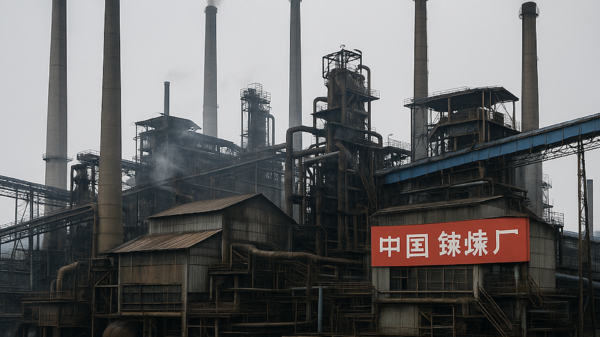The Wagner Group, a private military operation funded by Russia, is one of the largest beneficiaries of illegal gold mining, according to a new report from the World Gold Council.
Penned by former UK Deputy Prime Minister Dominic Raab, the report estimates suggest that Wagner made over USD$2.5 billion from illegal mining efforts since the invasion of Ukraine alone, which has since been turned over to feed Russia’s ongoing hostilities.
Artisanal and small-scale gold mining (ASGM) supports the livelihoods of millions of people in more than 80 countries, yet approximately 80 per cent of ASGM operates within the shadow economy.
The ASGM industry produces an estimated 20 per cent of the world’s yearly gold supply and accounts for about 80 per cent of gold mining employment worldwide.
The report, Silence is Golden, illuminates how criminal gangs, armed groups, and corrupt officials prey on ASGM communities. Intermediaries exploit these communities and launder gold out of countries through clandestine channels.
“Increasingly, there is evidence of the growing contribution of illegal mining to international crime, corruption and conflict,” said Hellen Clark, Extractive Industries Transparency Initiative board chair, in the report’s forward.
The report further identifies how businesses and governments fail to ensure transparency, blocking the implementation and enforcement of legal standards. Also, weak accountability mechanisms enable criminals to act with impunity, violating national and international laws. Meanwhile, criminal groups exploit miners for profit, forcing them into hazardous working conditions and subjecting them to human rights abuses.
Read more: China’s Zijin Mining battles Colombian cartels over gold mine access
Read more: Reaction to artisanal miner protests pose a challenge to democracy in Ghana
Strengthen legal frameworks to improve traceable supply chains
To tackle these challenges, the report outlines a four-pronged strategy with 24 actionable steps aimed at governments, international organizations, NGOs, mining companies, and development agencies. It urges stakeholders to prosecute and disrupt criminal networks and to strengthen international cooperation among G7 and G20 countries.
The report’s actionable steps include strengthening legal frameworks to regulate ASGM, enhancing the traceability of gold supply chains, and providing miners with safer equipment and training to reduce exploitation.
Governments are urged to establish task forces to prosecute criminal networks and collaborate with international organizations to share intelligence and dismantle smuggling routes.
In 2023, the US Treasury Department sanctioned four companies in the United Arab Emirates, Central African Republic, and Russia for their links to the Wagner Group and its late leader, Yevgeny Prigozhin, who authorities presume dead following a plane crash in August 2023.
“The Wagner Group funds its brutal operations in part by exploiting natural resources in countries like the Central African Republic and Mali,” said Brian Nelson, the Treasury’s Under Secretary for Terrorism and Financial Intelligence, said at the time the sanctions were announced.
Additionally, NGOs and development agencies should support miners by offering education on legal rights and promoting access to formal markets, enabling a shift away from reliance on exploitative intermediaries.
These measures rely on coordinated efforts across sectors to ensure effective implementation and long-term impact.
The report exposes the significant lack of transparency in businesses and governments, which hampers the enforcement of legal standards and allows dangerous criminals to operate unchecked.
Read more: Calibre Mining shuffles strength into its board for future growth
Read more: Calibre Mining highlights responsible energy usage in first-ever Climate Report
Artisanal miners in need of protection
The report indicates that the threats posed by illegal mining are more widespread than just funding Russia’s war of aggression. It also fuels civil wars, supports terrorist groups, and enables organised crime, posing a serious threat to global security.
Artisanal gold miners themselves are in need of protection. They regularly face violence from government forces, mercenaries, and criminal gangs. These groups profit from and launder illicit gold, often through major international hubs such as Hong Kong, India, Miami, Switzerland, Türkiye, and the UAE.
Additionally, affiliates of the Islamic State and Al-Qaeda in the Sahel have used extortion from ASGM communities as a key part of their expansion strategy.
Meanwhile, in Colombia, groups like the Clan del Golfo, the National Liberation Army (ELN), and dissident factions of the Revolutionary Armed Forces of Colombia (FARC) fund their operations through illegal mining.
This plunder not only exploits the miners but also deprives affected countries of significant income. For example, in one year, Sudan lost nearly USD$2 billion due to this illicit activity.
The report outlines a comprehensive strategy to combat the illicit gold trade and support responsible artisanal and small-scale gold mining communities.
It emphasizes the need for coordinated action from governments, international organizations, and the gold sector to prosecute criminals, prevent illegal profiteering, and integrate responsible ASGM into legal supply chains.
Governments and international bodies like the ICC and Interpol should prioritize prosecuting illegal gold trafficking networks, including those linked to the Wagner Group.
Donor countries should support regional judicial cooperation and provide technical assistance to integrate ASGM communities into formal markets.
Read more: Calibre Mining strikes gold: new high-grade discovery at Nicaragua’s Limon Mine
Read more: Mergers are reshaping the landscape of gold mining
Large-scale gold miners encouraged to adopt supply chain policies
Governments should also enforce sanctions against individuals and companies involved in illegal gold activities.
It also lays out the call for the OECD and Financial Action Task Force should expand their work on the gold sector, developing a framework for gold trade hubs to avoid blacklisting.
Furthermore, governments should adopt legal frameworks that ASGM communities can engage with and focus aid on integrating these communities, addressing issues like land rights and taxation. The G7, G20, and World Bank should support gold-buying schemes to incorporate ASGM into national economies.
Large and medium scale gold mining companies, a few examples including Barrick Gold Corporationa ((TSE: ABX) (NYSE: GOLD) and Calibre Mining Corp (TSE: CXB) (OTCMKTS: CXBMF), are encouraged to adopt sustainable supply chain policies and support ASGM integration through technical assistance and buyback programs. In terms of production, refineries should prioritize sourcing from responsible ASGM communities.
But the responsibility extends beyond production to the consumer as well. The report suggests that major gold-consuming countries should also educate consumers on the origins of gold, while the G7 and G20 should recognize the illicit gold trade as a systemic threat to global security.
The report concludes that without viable economic alternatives, many marginalized communities will remain trapped in hazardous and low-reward ASGM practices. It calls for a united effort to redirect illicit gold flows, improve conditions for miners, and offer sustainable economic solutions for affected populations.
joseph@mugglehead.com













